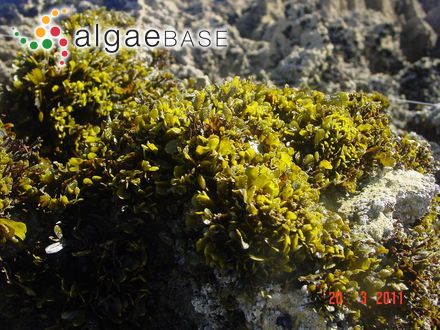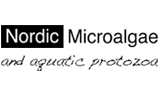Fucus guiryi Zardi, Nicastro, E.S.Serrão & G.A.Pearson 2011

Current name:
Fucus limitaneus (Montagne) Montagne
Near Aljezur, Amoreira beach, western Algarve, Portugal - 04 September 2011. Ester Serrão
Publication Details
Fucus guiryi Zardi, Nicastro, E.S.Serrão & G.A.Pearson 2011: 13, fig. 1 (as Fucus platycarpus)
Published in: Zardi, G.I., Nicastro, K.R., Canovas, F., Costa, J.F., Serrão, E.A. & Pearson, G.A. (2011). Adaptive traits are maintained on steep selective gradients despite gene flow and hybridization in the intertidal zone. PLoS ONE 6(6): 1-13.
Publication date: June 14, 2011 (on line and copies distributed)
Type Species
The type species (lectotype) of the genus Fucus is Fucus vesiculosus Linnaeus.
Status of Name
This name is currently regarded as a synonym of Fucus limitaneus (Montagne) Montagne.
Source of Synonymy
Almeida, S.C., Neiva, J., Sousa, F., Martin, N., Cox, C.J., Melo-Ferreira, J., Guiry, M.D., Serrão, E.A. & Pearson, G.A. (2022). A low-latitude species pump: Peripheral isolation, parapatric speciation and mating-system evolution converge in a marine radiation. Molecular Ecology 31: [1-21] 4797–4817, 7 figs.
Type Information
Praia da Amoreira, Aljezur, SW Portugal; (Zardi & al. 2011: 14)Gareth Pearson; March 20th, 2011; GALW; 15586 (Zardi & al. 2011: 14) Notes: Isotypes: GALW15587, GALW15588, GALW15589, GALW15590,
GALW15591.
Eponomy
"Named in honor of Michael Guiry, in recognition to his great contribution to phycology by creating AlgaeBase."
Origin of Species Name
Noun (singular possessive) (Latinised), in honour of Michael D. Guiry, Irish botanist.
General Environment
This is a marine species.
Description
Similar in
morphology to Fucus vesiculosus L. but distinguished from it by
hermaphroditic receptacles, the presence of a receptacle sterile
rim, monopodial branching, and the absence of bladders; by
shorter thallus and shorter frond length between the holdfast and
the first dichotomy; by less wide apical frond; by higher and wider
receptacles; by higher ratio of receptacle width:length and
receptacle height:length; by higher intertidal zonation and
physiological resilience to air exposure; by differences in the
nuclear protein coding gene transcripts (BiP1, clpB, clpC, clpP,
eIF3l, HSP90_1, HSP90_2, PXMP2/4_2, mpv17l2, TTC1, STI1,
CCT4, CCT-epsilon, PXMP2/4_1) and microsatellite loci (L20,
L78). Also similar in morphology to Fucus spiralis L. but
distinguished from it by the presence of a receptacle sterile rim
and monopodial branching; by longer thallus and frond between
the holdfast and the first dichotomy; by wider apical frond; by
shorter receptacle height; longer receptacle; wider receptacle; by
smaller ratio of receptacle width:length and receptacle height:
length; by lower intertidal zonation and physiological resilience
to air exposure; by differences in the nuclear protein coding gene
transcripts (BiP1, clpB, clpC, clpP, eIF3l, HSP90_1, HSP90_2, PXMP2/4_2, mpv17l2, TTC1, STI1, CCT4, CCT-epsilon,
PXMP2/4_1) and microsatellite loci (L20, L78). [Original description.]
Key Characteristics
Monoecious; sterile rim to conceptacles, monopodial branching.
Created: 26 June 2011 by M.D. Guiry.
Last updated: 31 October 2022
Verification of Data
Users are responsible for verifying the accuracy of information before use, as noted on the website Content page.
Linking to this page: https://www.algaebase.org/search/species/detail/?species_id=139457
Citing AlgaeBase
Cite this record as:
M.D. Guiry in Guiry, M.D. & Guiry, G.M. 31 October 2022. AlgaeBase. World-wide electronic publication, National University of Ireland, Galway. https://www.algaebase.org; searched on 05 December 2024
 Request PDF
Request PDF














